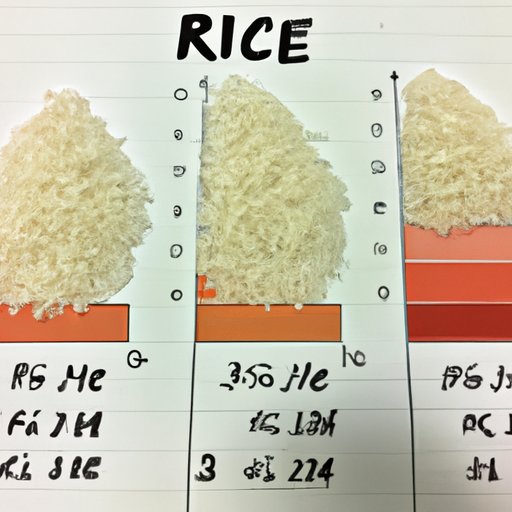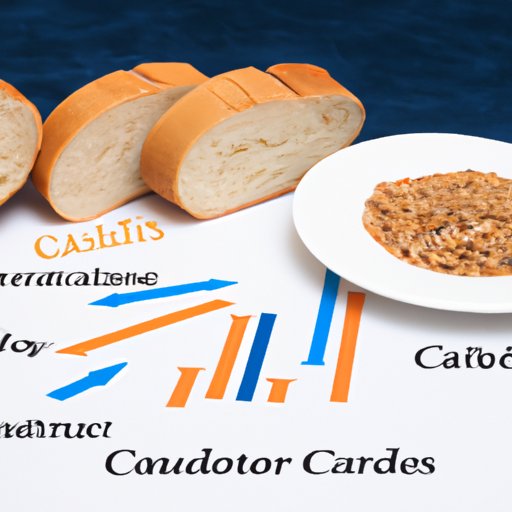Introduction
White rice is one of the most widely consumed staples in the world. It is a simple carbohydrate that is low in fat and calories and provides a quick source of energy. But does white rice have any nutritional value? In this article, we will explore the nutritional profile of white rice and examine how it can fit into a balanced diet.

Comparing the Nutritional Profile of White Rice to Other Types of Rice
White rice is a type of milled rice, which means that the bran and germ layers of the grain have been removed. This process removes many of the nutrients found in whole grains, including fiber, vitamins, and minerals. As a result, white rice has a much lower nutritional content than other types of rice.
Nutritional Content of White Rice: White rice is primarily composed of carbohydrates, with small amounts of protein and trace amounts of fat. One cup (158g) of cooked white rice contains 205 calories, 4.4g of protein, 0.4g of fat, and 45g of carbohydrates, including 1.6g of dietary fiber.
Nutritional Content of Brown Rice: Brown rice is a whole grain rice, meaning that the bran and germ layers are still intact. One cup (158g) of cooked brown rice contains 216 calories, 5.0g of protein, 1.8g of fat, and 44g of carbohydrates, including 3.5g of dietary fiber. Brown rice is higher in fiber, vitamins, and minerals than white rice.
Nutritional Content of Wild Rice: Wild rice is a species of grass native to North America. It is not technically a true rice, but it is often used as a substitute for white or brown rice. One cup (164g) of cooked wild rice contains 166 calories, 6.5g of protein, 0.7g of fat, and 35g of carbohydrates, including 3.0g of dietary fiber. Wild rice is higher in protein and fiber than white or brown rice.
Exploring the Health Benefits of Eating White Rice
Despite its relatively low nutrient content, white rice may offer some health benefits. For example, it is a good source of energy and can provide a quick boost of energy after exercise. Additionally, white rice is naturally gluten-free, so it can be a good option for those who are sensitive to gluten. Finally, white rice is low in fat and calories, so it can be a good choice for those trying to lose weight.
However, there are also potential risks associated with eating white rice. White rice is low in fiber, vitamins, and minerals, so it is important to consume it in moderation and include other sources of these nutrients in your diet. Additionally, white rice is a refined carbohydrate, which means that it is quickly absorbed by the body and can cause a rapid spike in blood sugar levels. Therefore, it is important to be mindful of portion sizes when consuming white rice.

Investigating How White Rice Fits into a Balanced Diet
White rice can be a healthy part of a balanced diet if consumed in moderation. It is important to pair white rice with other nutrient-dense foods, such as vegetables, legumes, and lean proteins. This will help to ensure that you are getting all of the essential vitamins and minerals that your body needs. Additionally, it is important to limit your intake of refined carbohydrates, such as white rice, and replace them with more complex carbohydrates, such as whole grains and legumes.
When it comes to substituting white rice for other carbohydrates, it is important to be mindful of the nutritional content of each food. For example, while white rice is low in fiber, brown rice is a good source of fiber. Similarly, while white rice is low in protein, wild rice is a good source of protein. Therefore, it is important to consider the nutritional content of each food when making substitutions.

Examining the Impact of Refined Carbohydrates on Health
Eating too many refined carbohydrates, such as white rice, can have negative health effects. Refined carbohydrates are quickly digested and can cause a rapid spike in blood sugar levels, leading to an increase in hunger and cravings. Additionally, eating too many refined carbohydrates can lead to weight gain, as well as an increased risk of type 2 diabetes and heart disease.
To reduce the intake of refined carbohydrates, it is important to focus on eating whole, unprocessed foods. Additionally, it is important to limit the amount of added sugars in your diet and opt for naturally sweetened foods, such as fresh fruits and vegetables. Finally, it is important to be mindful of portion sizes and try to balance your meals with a variety of nutrient-dense foods.
Evaluating the Pros and Cons of Eating White Rice
Overall, white rice can be a healthy part of a balanced diet if consumed in moderation. It is a good source of energy and can provide a quick boost of energy after exercise. Additionally, it is naturally gluten-free, low in fat and calories, and easy to prepare. However, it is important to be mindful of portion sizes and pair white rice with other nutrient-dense foods to ensure that you are getting all of the essential vitamins and minerals that your body needs.
On the other hand, eating too much white rice can have negative health effects. White rice is a refined carbohydrate, which means that it is quickly absorbed by the body and can cause a rapid spike in blood sugar levels. Additionally, it is low in fiber, vitamins, and minerals, so it is important to limit your intake of white rice and replace it with other complex carbohydrates, such as whole grains and legumes.
Conclusion
In conclusion, white rice can be a healthy part of a balanced diet if eaten in moderation. It is a good source of energy and can provide a quick boost of energy after exercise. Additionally, it is naturally gluten-free and low in fat and calories. However, it is important to be mindful of portion sizes and pair white rice with other nutrient-dense foods to ensure that you are getting all of the essential vitamins and minerals that your body needs.
It is also important to limit your intake of refined carbohydrates, such as white rice, and replace them with more complex carbohydrates, such as whole grains and legumes. By doing this, you can ensure that you are getting the most out of your meals and providing your body with all of the essential nutrients it needs.
(Note: Is this article not meeting your expectations? Do you have knowledge or insights to share? Unlock new opportunities and expand your reach by joining our authors team. Click Registration to join us and share your expertise with our readers.)
